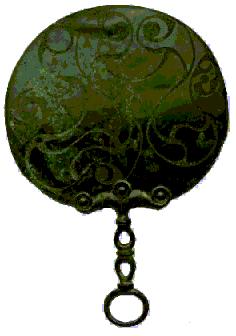- Language Description
- Indo-European Chronology (Celtic)
- Gaulish Concise Dictionary
- Links
 Celtic
peoples were called different names: Gauls in France, Belgae in Northern
France, Galates in the Balkans and numerous tribal names everywhere. But
there is no doubt that they all spoke one language, or similar varieties
of the same one. This comes from town names, inscriptions and Celtic words
written down by Greek and Roman authors. Their language system is what
is called "Classical Celtic": it was very close to the Italic group of
tongues, and Julius Caesar even had to write his letters to his legates
in Greek for Gaulish leaders not to be able to read them if they might
happen to gain hold of these missives. He did so because Latin
could be understood by Celts quite well without having had to study it.
Celtic
peoples were called different names: Gauls in France, Belgae in Northern
France, Galates in the Balkans and numerous tribal names everywhere. But
there is no doubt that they all spoke one language, or similar varieties
of the same one. This comes from town names, inscriptions and Celtic words
written down by Greek and Roman authors. Their language system is what
is called "Classical Celtic": it was very close to the Italic group of
tongues, and Julius Caesar even had to write his letters to his legates
in Greek for Gaulish leaders not to be able to read them if they might
happen to gain hold of these missives. He did so because Latin
could be understood by Celts quite well without having had to study it.
Gaulish was highly inflected, but had practically nothing in common with Insular Celtic morphology and phonetics: it had no initial mutations, had an ordinary Indo-European word order (subject - predicate - adverbial modifiers) and grammatical forms similar to those of the Proto-Indo-European model. Gaulish is referred to as being in the so-called "P-Celtic" group, as it uses p in place if the indoeuropean kw.
As Gaulish was quite similar to Latin it was quickly assimilated as
early as* the last centuries B.C. within this very large language area.
Popular Latin borrowed many words from Gaulish,
and even now in French, Italian and Spanish there is a fair number of Celtic
words. But even yet not too much is known about Gaulish, its structure
and vocabulary.